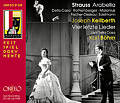ORFEO International
News
May 2010
† Anneliese Rothenberger
The price for great popularity in the arts can sometimes be high. Even the greatest successes in “serious” art can be diminished in the eyes of the public by supposedly “low-brow” appearances in the popular media.

C 328 931 B

C 429 962 I

C 392 952 I

C 651 053 DThat is what happened to Anneliese Rothenberger, who in the 1950s and ’60s belonged indisputably to the world élite in the repertoire of the lyrical coloratura soprano. All the same, this singer’s artistic maturity never suffered on account of her popularity with a large public. On the contrary: possessed of better judgement and of greater wisdom than many of her profession, she withdrew from her active singing career in the 1980s. She had already been involved in furthering young singing talent, but this now became of even greater importance to her. If one wishes to form a picture of the diversity of Anneliese Rothenberger at the peak of her career, the CD edition “Salzburger Festspieldokumente” remains of great value. Within the space of five years under the baton of George Szell, she led a first-rate cast in the world premières of Liebermann’s Penelope and Die Schule der Frauen, and in the same house sang Zdenka to Lisa Della Casa’s Arabella in Strauss’s opera. Who other than Anneliese Rothenberger could have done that? And who else could have enchanted the Salzburg public as a true Mozart singer in the decade after her triumphs in the 20th-century repertoire? For three summers, she was Konstanze in the legendary Entführung aus dem Serail under the team of Giorgio Strehler and Zubin Mehta; and for two of those summers, she sang alongside Fritz Wunderlich. In Wunderlich’s last season at the Salzburg Festival, as Anneliese Rothenberger later recalled, he gave his autograph to fans with the macabre note “in memoriam”. Now this Salzburg live recording with Wunderlich and Rothenberger is a doubly melancholic memento of their unique stage partnership, but also one that is matchless.
top |